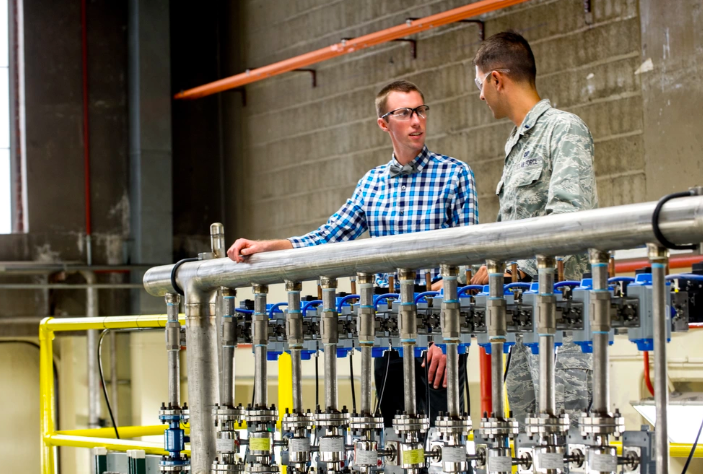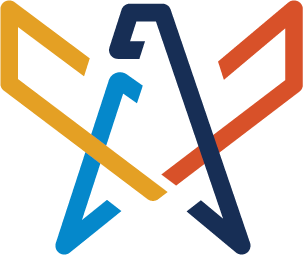
Funding Opportunities
The Air Force Office of Scientific Research funds and supports research within the Air Force Research Laboratory (AFRL), as well as universities and research sites across the country. Through these efforts, AFOSR ensures the transition of these cutting-edge results to the USAF and the USSF, where these findings can benefit the nation at large. AFOSR solicits various research proposals throughout the year through Broad Agency Announcements, as well as the various educational programs listed below:
Awards to Stimulate and Support Undergraduate Research Experiences (ASSURE)
More Information on Research Experiences for Undergraduates (REU), including ASSURE
The ASSURE program supports undergraduate research in DoD-relevant disciplines, and is designed to increase the number of high-quality undergraduate science and engineering majors who ultimately decide to pursue advanced degrees in these fields. This program aims to provide valuable research opportunities for undergraduates, either through ongoing research programs or through projects specially designed for this purpose. Research projects should allow high quality interaction of students with faculty and/or other research mentors and access to appropriate facilities and professional development opportunities. Active research experience is considered one of the most effective ways to attract and retain talented undergraduates in science and engineering.
The DoD ASSURE budget is $4.5 million annually. DoD expected ASSURE budget for new projects is approximately $1.5 million; this funding will be distributed among fifteen to twenty new ASSURE awards. DoD relevance will be considered in making funding decisions. Projects may be carried out during the summer months, during the academic year, or both. Sites may be proposed for durations of one to five years, with a three-year duration being typical. DoD executes the ASSURE program collaboratively with the National Science Foundation (NSF) through its Research Experiences for Undergraduates (REU) Sites Program. DoD funded ASSURE sites will be selected by DoD scientists and engineers, but will be overseen by NSF as part of the NSF portfolio of REU Sites. There is no separate application for the ASSURE program; ASSURE funding is awarded through the NSF REU Sites Program.
Starting in 2024, proposals will be due on the third Wednesday in August, annually thereafter.
For more information, contact assure@us.af.mil
Air Force Science & Technology Fellowship Program (STFP)
The Air Force Science & Technology Fellowship Program offers nationally competitive fellowship awards to postdoctoral and senior scientists to perform collaborative research at U.S. Air Force research facilities across the country. Since 1966, the Air Force S&T Enterprise has hosted over 1,000 fellows under the NRC Research Associateship Programs and many of these researchers have gone on to successful careers in government laboratories. The Air Force Science & Technology Fellowship Program continues this tradition of providing high quality research opportunities with Air Force scientists and engineers at Air Force Research Laboratory, the Air Force Institute of Technology, and the U.S. Air Force Academy.
Prospective applicants to the AFRL Research Associateship Fellowship Program must select a research project from among the large group of Research Opportunities listed on the program website. Prior to completing an application, prospective applicants should contact their proposed Research Adviser to assure that funding will be available if their application is recommended by NRC Research Associateship Program panels. Once mutual interest is established between a prospective applicant and a Research Adviser, an application is submitted through the NRC Research Associateship Programs online system. Reviews of applications to AFRL are conducted four times each year, and review results are available approximately six to eight weeks following the application deadline.
Rolling applications throughout the year - click here for key dates and eligibility
For more information, contact nrc.rra@us.af.mil
Image Credit: U.S. Air Force Academy Majors and Research, by Trevor Cokley
Air Force Visiting Scientist Program (VSP)
The Visiting Scientist Program (VSP) provides opportunities for outstanding Air Force scientists and engineers (AF S&E’s) to conduct full-time research at a non-government laboratory located within the USA. The duration of a VSP visit can be up to 179 days. The visits can be shorter, and can consist of non-contiguous durations as appropriate. AFOSR pays all TDY costs, while the AF S&E’s home organization continues to pay all other costs. Upon completion of the TDY, the AF S&E returns to their home organization.
Applications are ongoing
For more information, contact vsp.afosr@us.af.mil
Defense University Research Instrumentation Program (DURIP)
This program is administered through the Air Force Office of Scientific Research, the Army Research Office, and the Office of Naval Research. The DURIP program is for the acquisition of major equipment by U.S institutions of higher education to augment current or develop new research capabilities to support research in technical areas of interest to the DoD. DURIP is open only to U.S. institutions of higher education, with degree granting programs in science, math, and/or engineering. Proposing institutions should be seeking to purchase instrumentation in support of research areas of interest to the DoD, including areas of research supported by the administering agencies. Proposals to purchase instrumentation may request $50,000 to $3,000,000. Awards are typically one year in length. FY25 DURIP Selections have been made - to learn more, please visit defense.gov.
Applications are ongoing - click here to see the FY26 Grant Opportunity
For more information, contact DURIP@us.af.mil
Historically Black Colleges and Universities and Minority Institutions Program (HBCU/MI)
AFOSR HBCU/MI program consists of two main components:
AFOSR Core Research: Research proposals from HBCUs and MIs are reviewed by AFOSR Program Officers as part of their core program and may be funded from funds set aside by the AFOSR Director.
Department of Defense Infrastructure Support Program for Historically Black Colleges and Universities and Minority Institutions: The DoD has been providing grants for research and educational equipment at HBCUs/MIs. This program is administered by the Army Research Office, in collaboration with the AFOSR. Schools interested in this program should look for the Broad Agency Announcement that is usually published in the Fall of each year in the ARO webpage.
Applications are ongoing
For more information, contact HBCUMI@us.af.mil
Image Credit: Donna Lindner
Multidisciplinary Research Program of the University Research Initiative (MURI)
Click here for the FY26 Call for Proposals
MURI supports basic research in the science and engineering areas intersecting more than one traditional discipline. The program is focused on multidisciplinary team efforts to address issues of critical concern to the DoD and the AF. The goal of this program is to advance defense research, accelerate technology transition, and educate scientists and engineers in the interdisciplinary areas important to national defense.
MURI is a DoD-wide program which complements other DoD programs that support university research through the single-investigator awards. The awards are typically for a period of three years with two additional years as options. New awards can be funded up to $1.5M per year, with the actual amount contingent upon the availability of funds, the specific topic and the scope of the proposed work. All the award selections result from a merit based competition of the proposals. Proposal submission is a two-stage process including white papers and full proposals.
White Papers Due in May, Applications Due in September
For more information, contact HBCUMI@us.af.mil
National Defense Science and Engineering Graduate Fellowship (NDSEG)
Click here for more information
The National Defense Science and Engineering Graduate (NDSEG) Fellowship Program is a Department of Defense-sponsored fellowship program designed to increase the number of US citizens receiving doctorates in research discipline areas of military importance at US institutions. The NDSEG program serves as a pipeline for workforce development of future scientists and engineers conducting research of military importance whether in academia, government, or private industry.
Current NDSEG research disciplines include: Aeronautical and Astronautical Engineering, Astrodynamics, Biomedical Engineering, Biosciences, Chemical Engineering, Chemistry, Civil Engineering, Cognitive, Neural, and Behavioral Sciences, Computer and Computational Sciences, Electrical Engineering, Geosciences, Materials Science and Engineering, Mathematics, Mechanical Engineering, Naval Architecture and Ocean Engineering, Oceanography, Physics (including Optics), and Space Physics.
Applications open in September and close in November
For more information, contact NDSEG.afosr@us.af.mil
Image Credit: First Annual National Defense Science and Engineering Graduate Fellowship Program Conference, by John Williams
Presidential Early Career Award in Science and Engineering (PECASE)
Click here for more information
The PECASE recognize some of the nation's finest scientists and engineers who, while early in their research careers, show exceptional potential for leadership at the frontiers of scientific knowledge during the 21st century. The Awards foster innovative and far-reaching developments in science and technology, increase awareness of careers in science and engineering, give recognition to the scientific missions of participating agencies, enhance connections between fundamental research and national goals, and highlight the importance of science and technology for the nation's future. The Awards are conferred annually at the White House following recommendations from participating agencies.
Individuals can not apply to the PECASE program but MUST be nominated by an AFOSR Program Officer. Their proposal must address U.S. Air Force research interests as described in the current AFOSR Broad Agency Announcement (BAA).
For more information, contact PECASE@us.af.mil
Image Credit: First Annual National Defense Science and Engineering Graduate Fellowship Program Conference, by John Williams
Young Investigator Research Program (YIP)
Click here for more information
The Air Force YIP supports scientists and engineers who have received Ph.D. or equivalent degrees within the last seven years and show exceptional ability and promise for conducting basic research. The objectives of this program are:
to foster creative basic research in science and engineering;
enhance early career development of outstanding young investigators;
and increase opportunities for the young investigator to recognize the Air Force mission and related challenges in science and engineering.
Most YIP awards are funded up to $150,000 per year for three years, for a total of $450,000. Exceptional proposals will be considered individually for higher funding levels and/or longer duration.
White Papers due in June, Proposals due in August
For more information, contact afosryip@us.af.mil
If you need help formatting your white paper, click this link for helpful instructions and suggestions from AFOSR.










